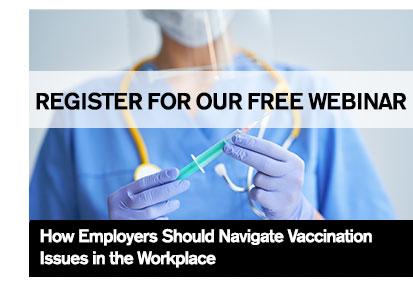 |
THIS ISSUE'S HEADLINES
One Shot or Two? Can Employers Ask Employees If They’ve Been Vaccinated?
Cybersecurity Enforcement Risks for ERISA Plan Sponsors
The Importance of a Seller’s Contracts When Buying a Business
Creating a Positive Corporate Culture Starts at the Top
Stay Informed – PLDO COVID-19 Resource Library

ONE SHOT OR TWO? CAN EMPLOYERS ASK EMPLOYEES IF THEY’VE BEEN VACCINATED?
 As we hopefully turn into the homestretch out of the COVID-19 pandemic, employers are eager to return their workplaces to some semblance of pre-COVID normalcy. While our workplaces will likely never be the same as they were in late 2019, the available vaccines provide some glimmers of hope. Indeed, like bears awakening from a long and dark hibernation, employers and employees are cautiously eyeing a return to the office. As we hopefully turn into the homestretch out of the COVID-19 pandemic, employers are eager to return their workplaces to some semblance of pre-COVID normalcy. While our workplaces will likely never be the same as they were in late 2019, the available vaccines provide some glimmers of hope. Indeed, like bears awakening from a long and dark hibernation, employers and employees are cautiously eyeing a return to the office.
As they embark on this return, many employers wonder whether they can ask their employees if they have been vaccinated. Your initial instinct might be “no” as you fear it could be too close to a health-related question that would be off-limits under HIPAA and other privacy laws. However, many employers are surprised to learn that they may ask their employees if they have been vaccinated. The EEOC has specifically advised employers that it is legal not only to ask employees if they have received a vaccine, but employers can also require employees to provide proof of that vaccination. (Note, though, that when asking for such proof, employers should clearly tell their employees to provide only proof of the vaccination and no other health information.)
However, as is the case in any new legal landscape, there are some pitfalls and unresolved issues that employers must keep in mind. First, while employers can ask about vaccination status, they should not ask employees why they have not been vaccinated as that could elicit protected disability or health-related information. Second, employers must be careful in screening new candidates and deciding only to hire vaccinated candidates, especially if vaccination is not necessary to protect the workplace and if the employer does not require its existing employees to be vaccinated. Third, if employers decide to require all of their employees to be vaccinated as a condition of employment, they must do so very carefully and after determining that vaccinations are a legitimate job requirement and they reasonably accommodate employees who refuse on religious and medical grounds. We have already started to see lawsuits filed by employees challenging mandatory vaccinations in the workplace, primarily on the grounds that the current vaccines are only approved for emergency use. Unfortunately, with the recent news about some potential serious side effects of one of the approved vaccines, courts will have the unenviable task of balancing the important interests of workplace safety against individual liberties.
Finally, employers should also keep an eye out for state-specific laws that may be passed to either restrict or clarify these issues. If history is any guide, states will make their own policy determinations in these matters and we anticipate that unless Congress addresses this issue by enacting nationwide legislation, there will be a patchwork of state-specific rules across the country. Due to the rapidly evolving landscape in this area, employers would be wise to proceed cautiously and thoughtfully.
To help employers make informed decisions, PLDO Partners Brian J. Lamoureux and Matthew C. Reeber will present a free webinar on this important issue on Wednesday, June 23, 2021 from noon to 1:00 p.m. Please click here for more details and to register. If you have questions or would like further information, please contact Attorney Lamoureux at 401-824-5155 or Attorney Reeber at 401-824-5105 or email bjl@pldolaw.com or mreeber@pldolaw.com.
[back to top]

CYBERSECURITY ENFORCEMENT RISKS FOR ERISA PLAN SPONSORS
 Employers that sponsor ERISA retirement or health plans should anticipate the Department of Labor (“DOL”) taking a more aggressive enforcement stance in regard to the cybersecurity of those plans. Recently, DOL published new cybersecurity guidance for plan sponsors and other fiduciaries. With over $9.3 trillion in ERISA retirement plans, plan fiduciaries have an obligation to take appropriate precautions to mitigate the risks of internal and external cybersecurity threats. Employers that sponsor ERISA retirement or health plans should anticipate the Department of Labor (“DOL”) taking a more aggressive enforcement stance in regard to the cybersecurity of those plans. Recently, DOL published new cybersecurity guidance for plan sponsors and other fiduciaries. With over $9.3 trillion in ERISA retirement plans, plan fiduciaries have an obligation to take appropriate precautions to mitigate the risks of internal and external cybersecurity threats.
DOL’s guidance has three components:
- Online Security Tips - aimed at plan members and beneficiaries.
- Cybersecurity Program Best Practices – aimed at recordkeepers and other service providers responsible for plan-related IT systems and data.
- Tips for Hiring a Service Provider with Strong Cybersecurity Practices – aimed at plan sponsors, with a list of questions that sponsors should ask when contracting with and monitoring service providers, and also suggesting specific terms to include in service provider contracts to enhance the cybersecurity of the sponsor’s plan.
Of note, DOL’s website lists “failing to properly select and monitor service providers” as an ERISA violation subject to civil enforcement.
Plan sponsors should take particular note of the guidance regarding contracts with service providers. Such contracts should “ensure that the contract requires ongoing compliance with cybersecurity and information security standards – and beware contract provisions that limit the service provider’s responsibility for IT security breaches.” DOL also suggests the following contract provisions:
- Information Security Reporting
- Clear Provisions on the Use and Sharing of Information and Confidentiality
- Notification of Cybersecurity Breaches
- Compliance with Records Retention and Destruction, Privacy and Information Security Laws
- Insurance
DOL notes that the guidance “compliments [its] regulations on electronic records and disclosures to plan participants and beneficiaries. These include provisions on ensuring that electronic recordkeeping systems have reasonable controls, that adequate records management practices are in place, and that electronic disclosure systems include measures calculated to protect Personally Identifiable Information.” As such, the guidance should be read as clarification of cybersecurity obligations that already have the force of regulation. In other words, plan sponsors would ignore this guidance at their peril.
More detail on this new guidance is available here. To learn more about cybersecurity planning, policies and best practices, or other employment issues, please contact PLDO Principal William E. O’Gara and Partner Joel K. Goloskie at 401-824-5100 or email wogara@pldolaw.com and jgoloskie@pldolaw.com.
[back to top]

THE IMPORTANCE OF A SELLER’S CONTRACTS WHEN BUYING A BUSINESS
 When purchasing another business, one of the most important aspects of due diligence is reviewing the selling business’ contracts. Often the selling business’ revenue stream is tied to some type of contract. For example, it may get income through services contracts, sales contracts, licensing contracts, or even insurance billing contracts. Accordingly, those types of contracts might actually represent most of the value of the seller’s business. The buyer is going to want to make sure that those valuable contracts are assignable to a new entity (the buyer) and remain in effect after the sale. Inability to assign crucial contracts to the buyer may affect the purchase price or even doom the entire transaction. When purchasing another business, one of the most important aspects of due diligence is reviewing the selling business’ contracts. Often the selling business’ revenue stream is tied to some type of contract. For example, it may get income through services contracts, sales contracts, licensing contracts, or even insurance billing contracts. Accordingly, those types of contracts might actually represent most of the value of the seller’s business. The buyer is going to want to make sure that those valuable contracts are assignable to a new entity (the buyer) and remain in effect after the sale. Inability to assign crucial contracts to the buyer may affect the purchase price or even doom the entire transaction.
Second, a review of contracts shows how a selling business conducts its operations. Who are their vendors and suppliers? What consultants and professionals do they rely on? What substantial assets and services does the seller need to conduct its business? The answers to these questions are generally found in a business’ contracts. Review of such contracts can give the buyer a clearer picture of not only what is necessary to operate the selling business but also how well a particular business operates.
Finally, a selling business’ contracts are often the largest liabilities of the selling business. The contracts to which the selling business is a party will show its obligations. Some of these liabilities might arise through contracts entered into in the ordinary course of business, such as leases or loans, and some liabilities might arise through contracts outside of the ordinary course of business, such as non-competition agreements or settlement agreements.
A proper review of the selling business’ contracts is necessary to ensure that the buyer is getting what it actually bargained for and that the purchase price reflects the true value of the selling business. For more information on buying and selling businesses, contract law or other business matters, please contact PLDO Attorney Joshua J. Butera at 401-824-5100 or email jbutera@pldolaw.com.
[back to top]

CREATING A POSITIVE CORPORATE CULTURE STARTS AT THE TOP
 Corporate culture is defined in many ways; however, it is generally referred to as the shared values and vision of the company that will serve to achieve short and long-term goals of the business enterprise. It is a top-down dynamic that will impact everyone in the company and is one of the most important responsibilities of a board member. Creating a strong culture will be expected by shareholders, customers, suppliers, and employees. If the culture is flawed or confusing, it will have a negative impact on the entire organization and will present obstacles to achieving the company’s strategic goals. Reputation is everything and as we all know, perception is paramount. Corporate culture is defined in many ways; however, it is generally referred to as the shared values and vision of the company that will serve to achieve short and long-term goals of the business enterprise. It is a top-down dynamic that will impact everyone in the company and is one of the most important responsibilities of a board member. Creating a strong culture will be expected by shareholders, customers, suppliers, and employees. If the culture is flawed or confusing, it will have a negative impact on the entire organization and will present obstacles to achieving the company’s strategic goals. Reputation is everything and as we all know, perception is paramount.
The key ingredients to the formation of a positive culture include transparency, high ethical standards, legal compliance, diversity and a long-term approach. If everyone in the organization consistently seeks to do the right thing, that will reflect positively on the board, meaning the board is fulfilling its responsibility to establish a corporate culture that will result in success. Directors are held to a high standard and if their decisions are viewed through the lens of a well-articulated corporate culture that is well-defined and communicated at all levels of the organization, success is inevitable.
An ethical corporate culture needs to be embedded in the strategic plan of the organization and embraced by management at all levels. Maintaining open communication regarding corporate values is essential and it starts at the board level, which should be comprised of individuals who are willing to challenge and ask questions without fear of reprisal. Owners should strive to populate the board with members who are independent thinkers that bring different perspectives and are fully engaged.
A board that shares ideas, develops strong relationships with management and constantly evaluates how they are doing is essential and will send clear messages to employees that culture is valued and essential. Evaluating corporate culture begins with clearly articulated and transparent goals, and must underscore diversity, legal compliance and the company’s overall strategies. Asking employees how they view the corporate culture creates trust and generally leads to positive actions. Surveys and assessments, if done openly, will provide a grading system that can serve as a guide to making improvements.
Corporate culture should also be reflected in who the company hires and how a succession plan will be implemented. What is the company’s code of conduct and what is the process in determining and dealing with violations? The board may consider hiring outside consultants to review the elements of its corporate culture and assist in measuring results. Finally, the board needs to be sensitive to how management is implementing corporate culture, i.e., what are the training methodology and hiring practices? Establishing a strong corporate culture is, and should be, a priority for every board member as it is a key to success. For further information on business planning strategies or other business matters, please contact PLDO Managing Principal Gary R. Pannone at 401-824-5100 or email gpannone@pldolaw.com.
[back to top]

STAY INFORMED – PLDO COVID-19 RESOURCE LIBRARY
 PLDO’s team of attorneys continue to add updates and advisories regarding the pandemic and its impact on families, businesses and organizations that are accessible in our online Resource Library. Among the featured articles include the following: PLDO’s team of attorneys continue to add updates and advisories regarding the pandemic and its impact on families, businesses and organizations that are accessible in our online Resource Library. Among the featured articles include the following:
If you have questions and would like further information, please contact your PLDO attorney directly in our Rhode Island, Massachusetts or Florida offices or call our toll free number at 866-353-3310 to discuss your legal matter. We are here to help.
[back to top]
|
 |





 Employers that sponsor ERISA retirement or health plans should anticipate the Department of Labor (“DOL”) taking a more aggressive enforcement stance in regard to the cybersecurity of those plans. Recently, DOL published new cybersecurity guidance for plan sponsors and other fiduciaries. With over $9.3 trillion in ERISA retirement plans, plan fiduciaries have an obligation to take appropriate precautions to mitigate the risks of internal and external cybersecurity threats.
Employers that sponsor ERISA retirement or health plans should anticipate the Department of Labor (“DOL”) taking a more aggressive enforcement stance in regard to the cybersecurity of those plans. Recently, DOL published new cybersecurity guidance for plan sponsors and other fiduciaries. With over $9.3 trillion in ERISA retirement plans, plan fiduciaries have an obligation to take appropriate precautions to mitigate the risks of internal and external cybersecurity threats.  When purchasing another business, one of the most important aspects of due diligence is reviewing the selling business’ contracts. Often the selling business’ revenue stream is tied to some type of contract. For example, it may get income through services contracts, sales contracts, licensing contracts, or even insurance billing contracts. Accordingly, those types of contracts might actually represent most of the value of the seller’s business. The buyer is going to want to make sure that those valuable contracts are assignable to a new entity (the buyer) and remain in effect after the sale. Inability to assign crucial contracts to the buyer may affect the purchase price or even doom the entire transaction.
When purchasing another business, one of the most important aspects of due diligence is reviewing the selling business’ contracts. Often the selling business’ revenue stream is tied to some type of contract. For example, it may get income through services contracts, sales contracts, licensing contracts, or even insurance billing contracts. Accordingly, those types of contracts might actually represent most of the value of the seller’s business. The buyer is going to want to make sure that those valuable contracts are assignable to a new entity (the buyer) and remain in effect after the sale. Inability to assign crucial contracts to the buyer may affect the purchase price or even doom the entire transaction.  Corporate culture is defined in many ways; however, it is generally referred to as the shared values and vision of the company that will serve to achieve short and long-term goals of the business enterprise. It is a top-down dynamic that will impact everyone in the company and is one of the most important responsibilities of a board member. Creating a strong culture will be expected by shareholders, customers, suppliers, and employees. If the culture is flawed or confusing, it will have a negative impact on the entire organization and will present obstacles to achieving the company’s strategic goals. Reputation is everything and as we all know, perception is paramount.
Corporate culture is defined in many ways; however, it is generally referred to as the shared values and vision of the company that will serve to achieve short and long-term goals of the business enterprise. It is a top-down dynamic that will impact everyone in the company and is one of the most important responsibilities of a board member. Creating a strong culture will be expected by shareholders, customers, suppliers, and employees. If the culture is flawed or confusing, it will have a negative impact on the entire organization and will present obstacles to achieving the company’s strategic goals. Reputation is everything and as we all know, perception is paramount. 